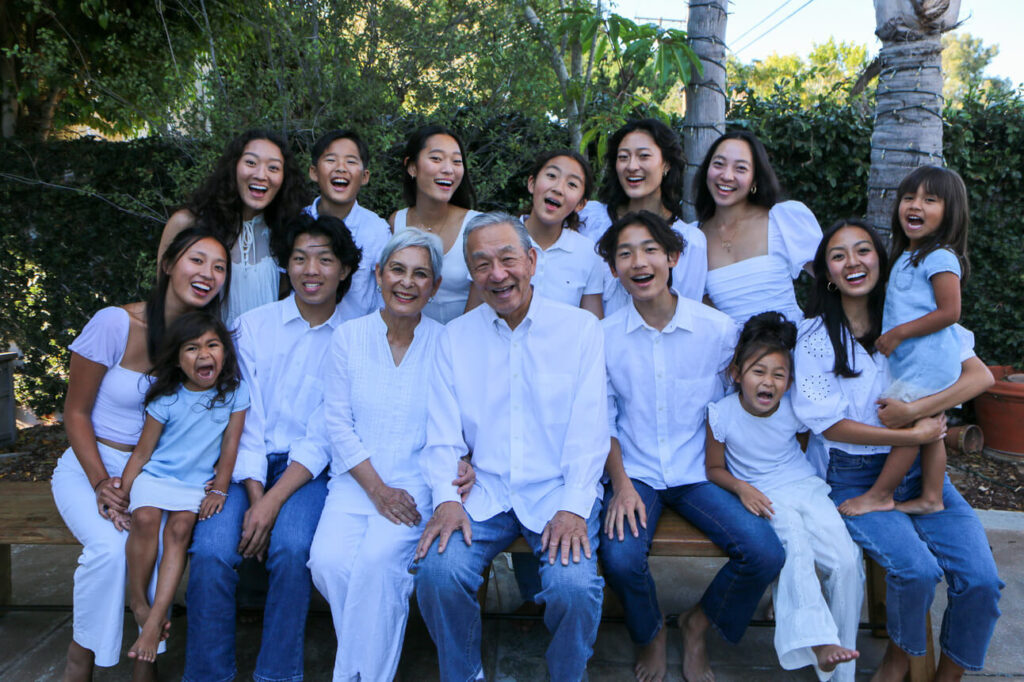When the pandemic began in 2020, I was concerned about my grandchildren’s spiritual, mental, and emotional well-being because they were sequestered at home. I felt led by the Lord to write daily devotionals for them.
Because we live in the 21st century, I had the perfect vehicle for daily devotionals: text messaging. Since I am a “digital alien,” I composed the devotionals on a Word document, sent it to myself via email, and transferred it to a group text each morning. My grandchildren responded to the daily devotionals by tagging them with a heart, “thumbs-up,” their avatar, or a variety of emojis.
I have written almost 880 devotionals since April 2020. It’s hard to believe what the Lord has had me do, but I plan on continuing until the Lord says otherwise or my mind goes blank.
With the help of the SOLA Network, I am sharing some of the devotionals as “Letters from Grandpa.” I hope these edited devotionals bless you as you read them as much as they have blessed me as I wrote them. The endgame for them is that my grandchildren will become more like Jesus, and I hope it helps you to be like Jesus too.

Dear Grandchildren,
Here are “Ten Things I Have Learned About Conflict.”
James teaches us that trials lead us to become perfect and complete (James 1:2-4). I say “Amen” to that. Trials grow us like nothing else can, especially when the trial involves conflict. Here is what I have learned about conflict in light of God’s Word.
First, I learned that most people have to blame someone. This started in the Garden of Eden and continues to this day (See Genesis 3). Remember to listen to both sides before making a determination, especially if you are involved in the conflict.
As a pastor, I have been requested to counsel people who are in conflict with others. It might be a spouse, a parent, a child, a relative, an employee, a fellow church member, and the list goes on. A passage of Scripture that has helped me immensely during these times of counsel is Proverbs 18:17: “The first to plead his case seems right, until another comes and examines him.” Always try to listen to both sides before forming an opinion.
Second, I learned that people do sinful things because they are broken and hurt. Most people are not malicious or sociopathic. They do unwise things because they are hurting. Usually, they think they are doing what is right. Proverbs 21:2 says, “Every man’s way is right in his own eyes, but the LORD weighs the hearts.”
One of the goals of helping others in conflict is to see their own role or sin in the matter. Very seldom is one person all right and the other person all wrong.
Third, I learned that we need to be careful about what we say, especially in a public forum. James 1:19 says, “This you know, my beloved brethren. But everyone must be quick to hear, slow to speak and slow to anger…” Be very cautious in the use of things like Facebook, emails, blogs, and Twitter to engage in conflict. Once you use a public platform, it can never be eradicated. It is out there forever.
James tells us to be “quick to hear,” which means to make sure we seek to “understand before being understood.” This admonition fits the second point I shared about conflict (“The first to plead his case…”). James goes on, “be slow to speak,” which means don’t react quickly and fire off a tweet, an email, or an entry on Facebook. Think, pray, and maybe seek counsel about it first. James closes by stating, “Be slow to anger.” Anything said or done in anger is normally regrettable.
Fourth, I learned that there is usually a seed of truth in the accusations of others. Jesus said in His Sermon on the Mount, “Why do you look at the speck that is in your brother’s eye, but do not notice the log that is in your own eye?” (Matthew 7:3). What’s interesting and revealing about this teaching is that the speck and log are made out of the same material, which means that the things we are most critical about in others may somehow be an issue in our own lives.
Jesus was admonishing those who judge and criticize others when they have bigger issues in their own lives. However, the one being critiqued still has a speck in their eye. We cannot be helpful to them before we begin to deal with the log in our own eyes.
Fifth, I learned that we should desire peace and unity. Romans 12:18 says, “If possible, so far as it depends on you, be at peace with all men.” This is not advocating a “doormat” theology but one of peace over revenge. Our goal in a dispute should not just be to win but to find healing and peace to the glory of God.
There is a phrase that has been helpful to me, “unity over unanimity.” Merriam-Webster defines unanimity as “the quality or state of being unanimous.” It is about consensus and agreement. In most instances, unity, which is “the state of being united or joined as a whole” (Oxford Languages), is more important than unanimity. There are times we should agree to disagree.
Sixth, I learned that we should be willing to forgive others who have hurt us or harmed us in any way. Paul wrote in Ephesians 4:32, “Be kind to one another, tender-hearted, forgiving each other, just as God in Christ also has forgiven you.”
There are times when being a Christian is challenging. We are to forgive those who have sinned against us. Since Jesus has forgiven us through an incredible act of love and sacrifice by going to the cross to die for us, how can we do any less than to forgive others, even if the cost seems too great?
I think this is one of the hardest things we are called to do as children of God. For me, it has been a lifelong journey. It is still difficult to forgive those who have sinned against me. The journey, however, has been incredibly worthwhile as I seek to be like Jesus.
Seventh, I learned that we should desire reconciliation. Matthew 18:15 states, “If your brother sins, go and show him his fault in private; if he listens to you, you have won your brother.” If someone sins against you, the goal is not to get even or justify yourself in the eyes of others but to reconcile with the person. Note the verse says to go to them in private, which would exclude airing things on social media.
Reconciliation is a tricky thing. Note that the passage says, “IF” he listens, not “when” he listens or “that” he listens. There is no guarantee reconciliation will happen.
Reconciliation is bilateral, whereas forgiveness can be unilateral. It takes the other person to cooperate if reconciliation is to be achieved. In my opinion, just do the best you can to reconcile and leave the rest to the Lord.
Eighth, I learned that we have no need to vindicate ourselves. Psalm 24:4-5 says, “He who has clean hands and a pure heart, who does not lift up his soul to an idol or swear by what is false. He will receive blessing from the Lord and vindication from God his Savior.”
In my early years of ministry, I learned this through some very painful experiences. There was a small group of people in the church that wanted to oust me as senior pastor. As much as I wanted to “fight back,” the Lord had me keep confidentiality and stand on His Word. I said little except to share what happened in general terms.
The Lord delivered me when the leader of the group overstepped boundaries at a congregational meeting, and then everyone understood that it was the group’s issues rather than my incompetence. Then the members of that group moved out of the area because of changes in employment and were no longer a part of our church.
God is the Deliverer. If we stand in righteousness (not perfection); He will vindicate us.
Ninth, I learned that we have no need to exact vengeance. Paul wrote in Romans 12:19b, “’ Vengeance is Mine, I will repay’ says the Lord…” In many of us, there is an inherent need to “get even.” Personally, I am a competitive person, so the desire to “get even” feels like an imperative. If you score on me, I will score on you—twice.
By Merriam-Webster’s definition, vengeance is “punishment inflicted in retaliation for an injury or offense.” The Word of God calls us to never inflict punishment for a wrong suffered. Not only does vengeance belong to the Lord, but we are also instructed to:
- “Bless those who persecute you; bless and do not curse” (Romans 12:14).
- “Never pay back evil for evil to anyone” (Romans 12:17a).
- “Never take your own revenge, beloved…” (Romans 12:19a)
Finally, in Romans 12:21, Paul wrote, “Do not be overcome by evil, but overcome evil with good.”
The twelfth chapter of Romans is filled with admonitions to live life peaceably, without rancor or revenge. It is one of the chapters of the Bible that has influenced my daily living the most.
The lessons found in Romans 12 were driven home early in ministry. As I shared in the previous point, a group of people attempted to oust me as senior pastor. One couple moved to another area of California, and eventually, they decided to do missionary work in Japan. During their stay, they ran into numerous issues. They called me for assistance, even though they never settled their disputes with me. As much as I did not want to help them, I recalled the verses in Romans 12 and felt led to aid them.
This resulted in my first trip to Japan. My journey was to bless and live peaceably with two who seemed to be my enemies.
Tenth, I learned that we are called to bless. The concluding thought in Romans 12 is that we are to overcome the need to seek revenge and “bless those who persecute you; bless and do not curse.” We are to overcome evil or wrong with good.
In my final chapter of ministry, I tried to teach our church family that we are “blessed to be a blessing.” God has so richly blessed us so that we can bless others. When it comes to conflict, we are to forgive rather than inflict suffering. We are to bless rather than impose harm. We are to seek after God’s righteousness rather than exact retribution.
No one ever said that it was easy being a Christian. In fact, in today’s world, it is the road less traveled.
Here’s the final piece of the story concerning the couple who went to Japan. Decades later, the husband passed away. The family contacted me to do his funeral. I can say with a clear conscience that I had no hesitation in officiating his memorial service. My goal was unencumbered. I was to bless the memories of his life and bring glory to God.
The Lord brought me to a place where I could take on the attitude of Jesus and bless those who persecuted me. It’s interesting how the Lord can turn even the most trying of experiences into things that are good and positive.
Obviously, there are more than 10 things we need to learn about dealing with conflict. It is my hope that this article on the subject will help you deal with the conflicts that will arise in your life. May you respond as Jesus would respond.
Love,
Grandpa

